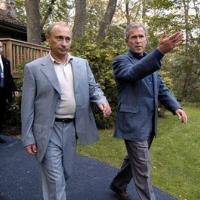This past Sunday, Russians went to the polls to vote in national parliamentary elections. The result was hardly in doubt -- the United Russia Party of Russia's President Vladimir Putin swept to victory. Equally predictable was the reaction of most Western media to this largely foreordained result. We are told that Putin is reviving the Soviet Union and that he has been busy building a cult of personality while crushing all political opposition. More importantly, we are told that Putin is reigniting the Cold War rivalry between Russia and the United States. This is the message that we constantly read on the editorial pages of the Washington Post and the Wall Street Journal, even as the business sections of each paper continue to report the tremendous growth of the Russian economy since Putin took office in 2000. Yet if the Kremlin is really hell bent on another Cold War with America, why is the Pentagon still using huge Russian transport planes to haul American war materiel into Iraq and Afghanistan? If the Putin Administration is systematically renationalizing Russian industries, why did the first six months of 2007 see more foreign investment in Russia than during the entire decade of the 1990s?
The United States Should Learn to Live with the New Russia

